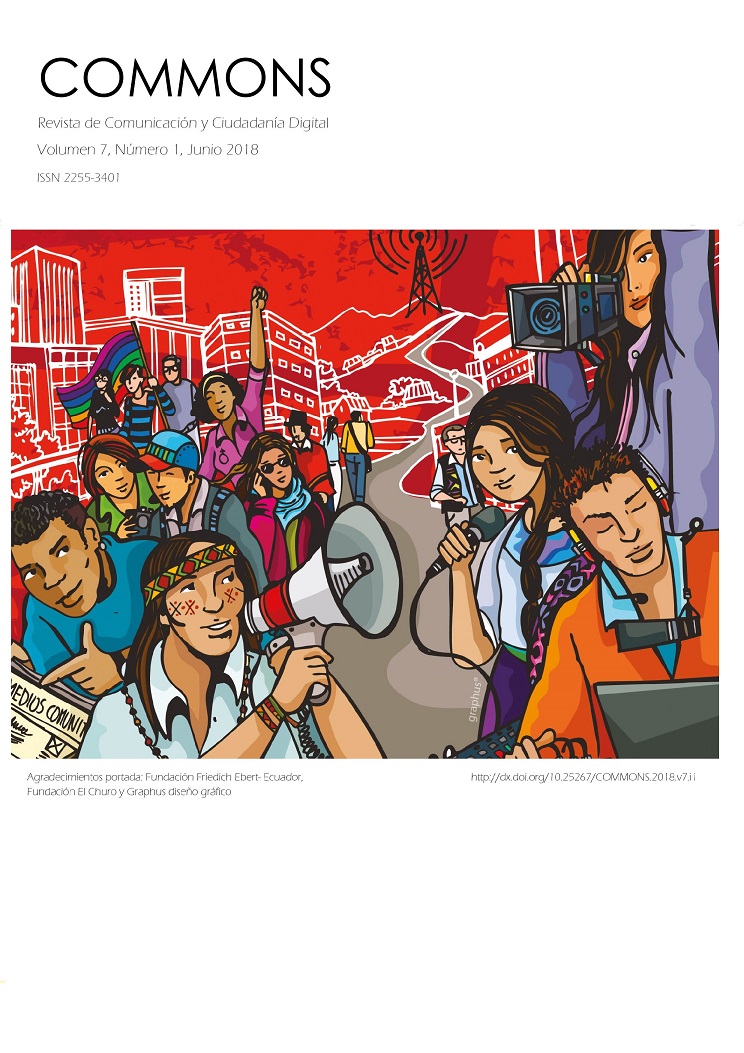Digital Disruption in Popular Media Practices in Brazil / Efectos de la ruptura digital en prácticas de medios populares en Brasil

Info
Abstract
This article discusses the digital disruption in popular media practices in Brazil. It is based on interviews conducted from 2014 to 2016 with 55 communicators attached to 20 social movements and community associations all over the country. The results show a prevalence of analogical media that coexist with different grades of appropriation of digital technologies. The lack of resources explains part of this coexistence, so socioeconomic conditions still represent a barrier for the development of popular media. But there are also practical and strategical reasons that justify these choices. Mainly, it is important to observe how digital disruption is a long standing process that transforms practices both in the level of technical options but also in the sense of developing media for social change.
Keywords
Downloads
How to Cite
License
Authors who have published with this journal accept the following terms:
- Authors shall retain their copyright and guarantee the journal the right of first publication of their work, which shall simultaneously be subject to the Creative Commons 3.0 Recognition License, which allows third parties to share the work as long as its author and first publication are indicated in this journal.
- Authors may adopt other non-exclusive licensing agreements for the distribution of the published version of the work (e.g., depositing it in an institutional telematic archive or publishing it in a monographic volume) provided that the initial publication in this journal is indicated.
- Authors are permitted and encouraged to disseminate their work via the Internet (e.g., in institutional telematic archives or on their website) before and during the submission process, which may lead to interesting exchanges and increased citations of the published work. (See The Effect of Open Access).
References
APPADURAI, A. (1990). Disjuncture and Difference in the Global Cultural Economy. In Theory Culture Society, 7, (pp. 295-310).
BRASIL, PRESIDÊNCIA DA REPÚBLICA - SECRETARIA DE COMUNICAÇÃO SOCIAL (2014). Pesquisa brasileira de mídia 2014: hábitos de consumo de mídia pela população brasileira. Brasília: Secom.
CARDON, D. (2010). La démocratie Internet. Paris: Seuil.
CASTELLS, M. (2013). Communication Power. Oxford: Oxford University Press. 2nd ed.
KAUFMANN, J. C. (1996). L’entretien compréhensif. Paris: Nathan.
KROTZ, F. (2007). The meta-process of ‘mediatization’ as a conceptual framework. Global Media and Communications, 3 (3).
MARÍ SÁEZ, V. M. (2006). Communication, networks and social change. Keys for the Creative Incorporation of Information and Communication Technologies Into Social Movements. Gumucio-Dragon, A. & Tufte, T. In Communication for Social Change Anthology: Historical and Contemporary Readings (1009-2014). South Orange, New Jersey: Communication for Social Change Consortium.
MASTRINI, G., & BECERRA, M. (2011). Estructura, concentración y transformaciones en los medios del Cono Sur latinoamericano. Comunicar - Revista Científica de Educomunicación, 36 (XVIII), (pp. 51-59).
PERUZZO, C. M. (1998). Comunicação nos Movimentos Populares. Petrópolis: Vozes.
PERUZZO, C. M. (2008). Conceitos de comunicação popular, alternativa e comunitária revisitados. Reelaborações no setor. Palabra Clave, 11 (2).
ROSEMBACH, C. J., & ZOTTIS, J. (2013). Comunicação Comunitária Alternativa. 8º Mutirão Brasileiro de Comunicação. Natal (RN).
SUZINA, A. C. (2015). Mais conectados, mais comuns? Recursos digitais nas experiências midiáticas apresentadas no 8º Mutirão Brasileiro de Comunicação. In C. M. Peruzzo, & M. A. Otre, Comunicação Popular, Comunitária e Alternativa no Brasil. Sinais de resistência e de construção da cidadania (222-245). São Bernardo do Campo: UMESP.
SUZINA, A. C. & PLEYERS, G. (2016). Media practices and the challenge of political asymmetries. Observatorio (Special Issues: Media, Internet and Social Movements in the context of asymmetries), (pp. 1-10).
TUFTE, T. (2013, jul-dez). O renascimento da Comunicação para a transformação social - Redefinindo a disciplina e a prática depois da “Primavera Árabe”. Intercom - RBCC , 36 (2), (pp. 61-90).
UNESCO (2014). Tendencias mundiales en libertad de expresión y desarrollo de los medios: Situación regional en América Latina y el Caribe. Montevideo, Uruguay: Oficina Regional de Ciencias de la UNESCO para América Latina y el Caribe, Sector Comunicación e Información.


